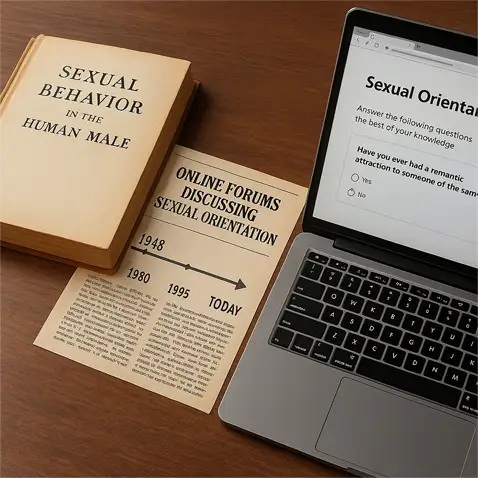The journey from mid-20th-century clinical scales to today’s privacy-first, browser-based quizzes charts a remarkable shift in both methodology and accessibility. Alfred Kinsey’s pioneering Heterosexual–Homosexual Rating Scale (1948) laid the groundwork for self-reported orientation measures, evolving through Storms’s two-axis model (1980) and Klein’s Sexual Orientation Grid before finding a new home online. Early internet hubs like TGForum (1995) offered peer‑support rather than formal quizzes, but by the 2000s research-backed tests—IDRlabs’s free Kinsey Scale quiz and ARealMe’s equivalent—brought psychometric tools to anyone with a browser. The mid-2000s saw BuzzFeed popularise “Am I gay?” list-style quizzes, embedding them in social media feeds and cementing their status as a queer rite of passage. Today’s leading platforms—exemplified by Gay Test Quiz s 12-question, client-side quiz—marry speed with full GDPR compliance and accessible design, signalling a new era of confidential self-exploration.
Foundations in Clinical Research
Alfred Kinsey’s first volume, Sexual Behavior in the Human Male (1948), introduced a seven-point scale to illustrate that sexual attraction exists along a continuum rather than in binary categories. Subsequent decades saw refinements: Michael Storms added orthogonal axes for behaviour and attraction in 1980, and Fritz Klein’s 1978 grid incorporated temporal and emotional dimensions, broadening the concept of orientation. These academic frameworks informed later digital adaptations, offering validated question sets that could be transposed into online formats.
The Dawn of Digital Self-Checks
The mid-1990s internet provided the first informal spaces for orientation queries. In 1995, TGForum emerged as a text-based hub where trans and non-binary users exchanged insights on identity, though it did not host formal quizzes. By the early 2000s, websites like IDRlabs offered browser-based Kinsey Scale tests—free, research-informed and globally accessible at no cost. Around the same time, ARealMe launched its own 0–6 scale quiz, emphasising anonymity and simplicity to reach curious users beyond academia.
The Viral Quiz Phenomenon
Founded in 2006, BuzzFeed capitalised on personality-quiz formats to drive engagement, introducing countless “Am I gay?” and similar quizzes designed more for entertainment than accuracy. A recent Guardian retrospective notes that such quizzes—often asking about favourite colours or pasta choices—became a nostalgic rite of passage for many queer individuals, despite offering no real diagnostic insight.
From Novelty to Nuance
While entertainment-focused quizzes dominated social feeds, professional and health-oriented platforms refined online assessment. Advanced tests now integrate brief psychoeducational content, link directly to mental-health resources and adhere to strict privacy standards. Research continues to explore digital interventions: systematic reviews show that guided, single-session programmes can reduce internalised stigma and spur help-seeking behaviour among LGBTQ+ youth.
The Current Landscape
GayTestQuiz.com exemplifies today’s state-of-the-art approach: a 12-question, client-side quiz that yields a clear percentage score in under five minutes, while collecting no personal data and ensuring full GDPR compliance. Built-in ARIA attributes and a responsive interface ensure accessibility across devices and abilities, melding methodological rigour with user-centred design.
From Kinsey’s groundbreaking 1948 reports to TGForum’s peer dialogues and BuzzFeed’s viral quizzes, the evolution of sexual orientation self-assessment mirrors broader shifts in technology, privacy and community engagement. Today’s leading platforms honour this legacy by blending validated measures with modern UX and data-protection standards—offering each individual a confidential, informative first step on their journey of self-discovery.